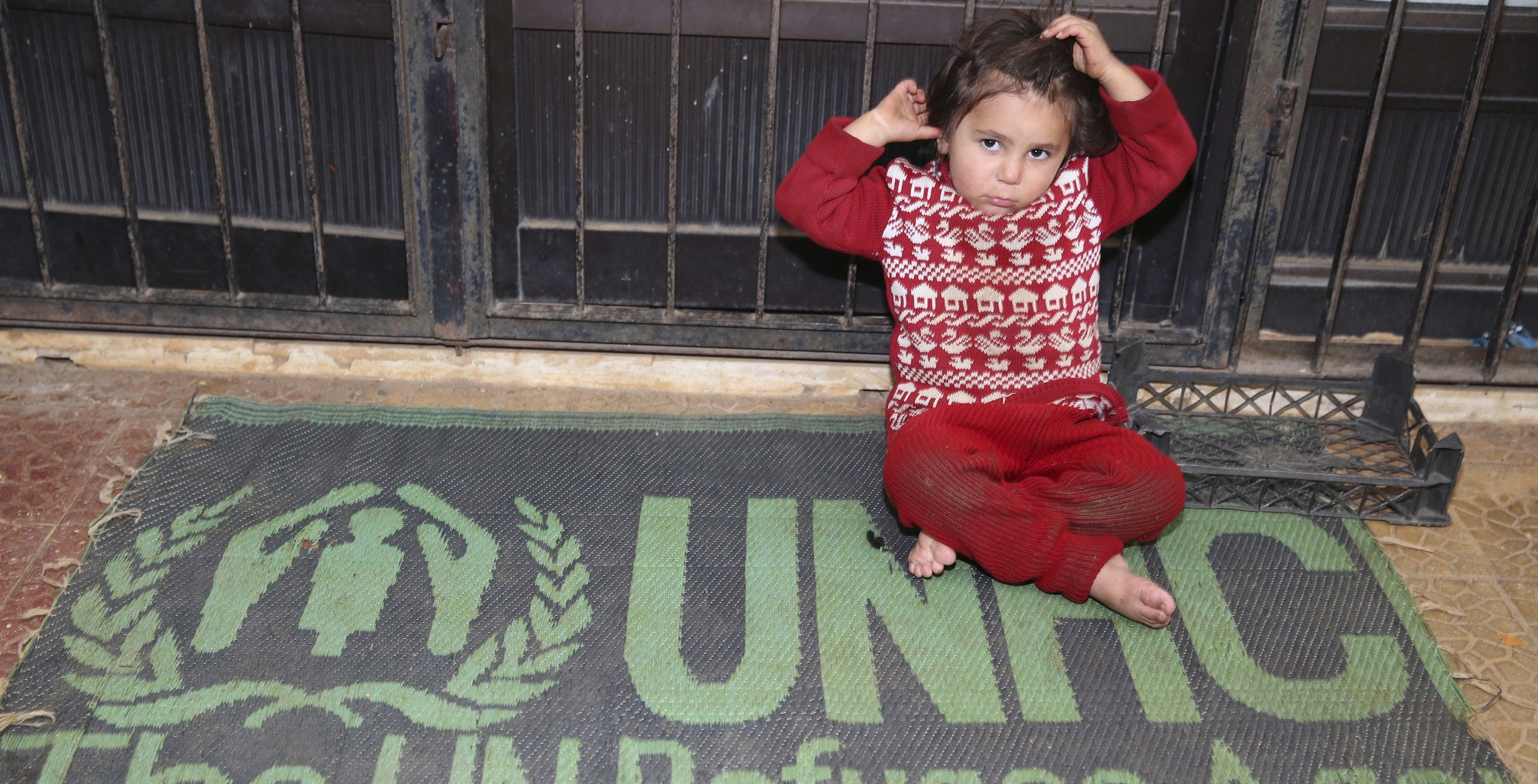This is a summary of what was said by UNHCR spokesperson Matthew Saltmarsh – to whom quoted text may be attributed – at today’s press briefing at the Palais des Nations in Geneva.

A Syrian displaced girl sitting on a UNHCR sleeping mat in this stadium which is a shelter for her and her family. ; Thousands of displaced families, mainly from Aleppo, are staying in makeshift shelters in Tartous that lack the basic services. The coastal city of Tartous on the Mediterranean, during the winter is usually wet with storms of heavy rain. UNHCR together with its implementing partners rushed to make these shelters ready for the rain season, through the winterization of the shelters and providing most needed core relief items including plastic sheeting, sleeping mats, blankets, mattresses, kitchen sets and hygiene kits.
25 November 2016 |
With the onset of winter and temperatures falling in parts of the Middle East, UNHCR, the UN Refugee Agency, has started delivering life-saving assistance to 4.6 million displaced Iraqis and Syrians to help them weather the adverse conditions.
Nearly 15 million displaced Iraqis and Syrians face yet another season of grinding hardship and uncertainty, away from their homes and livelihoods. The continuing offensive in Mosul, Iraq, has already displaced scores of thousands.
UNHCR aims to reach 3.2 million Syrian IDPs and refugees and 1.4 million displaced Iraqis within Syria and Iraq, as well as in Turkey, Jordan, Lebanon and Egypt. By comparison, last year, a total of 3.2 million displaced Syrians and Iraqis received winter aid from UNHCR.
The USD 355 million ‘Winter Assistance Plan’ for 2016-2017 is only partially funded. The bulk of the USD 68 million shortfall is for Iraq’s winter plan for IDPs, which is particularly concerning as the offensive in Mosul has caused significant displacement.
The UNHCR aid includes a mixture of cash payments to those in need, as well as the distribution of winter necessities like clothing, blankets, heating fuel, insulation materials and other basics. Engineering support is also provided in camps and settlements.
Overall, assistance is increasingly moving towards cash, which offers flexibility and independence to recipients. Regionally, half of displaced Syrians being targeted, or 1.6 million people, will receive some form of cash assistance. For displaced Iraqis, 75 per cent will benefit from cash payments. Distribution of winter items is already underway; across the region, 41 per cent of winter items have been released.
In Iraq, the distribution of essential winter items to 1.2 million displaced Iraqis is accelerating, including for families recently displaced in the current Mosul offensive. Around 178,000 Syrian refugees will also benefit. UNHCR’s winter assistance programme for Iraqi refugees is just half-funded, leaving a USD 62 million gap.
In Syria, winter distribution started in September, targeting over 1.2 million internally displaced persons and refugees, with a budget of USD 30 million. So far, assistance has been provided to nearly 800,000 people in the forms of winter clothing and shelter kits. Priority is being given to newly-displaced, vulnerable families and those in sub-standard shelters in hard-to-reach areas.
In Jordan, UNHCR will provide winter assistance to over 292,000 vulnerable Syrians and nearly 30,000 Iraqis and other nationalities. All Syrian refugees in camps will be provided with cash to address shelter maintenance or non-food items, and for gas.
UNHCR aims to assist 870,000 Syrian refugees and 6,000 Iraqi refugees in Lebanon. For the first time in Lebanon, a new formula is being used to identify those most in need. Seasonal cash assistance of USD 147 per month will help vulnerable households to meet their winter needs, in addition to USD 75 for those having already received assistance to meet extra seasonal expenses.
In Turkey, UNHCR aims to reach 540,000 vulnerable Syrian and 22,000 Iraqi refugees living in and out of camps. Camp residents will receive warm clothing; one-off cash payments via debit cards of USD 200-300 per family, which replaces vouchers, will be available for urban refugees.
A total of 86,500 refugees will receive seasonal support, primarily through cash payments, in Egypt. A one-time payment of USD 38 per person is being distributed to those in need, through Post Offices for Syrian refugees in cold areas, while for Iraqi refugees and others, cash assistance will be provided through ATM cards.
Detailed information on our country-by-country response is available in the ‘2016-17 UNHCR Regional Winter Assistance Plan’.
For further information on our winter efforts, please contact:
Share on Facebook Share on Twitter